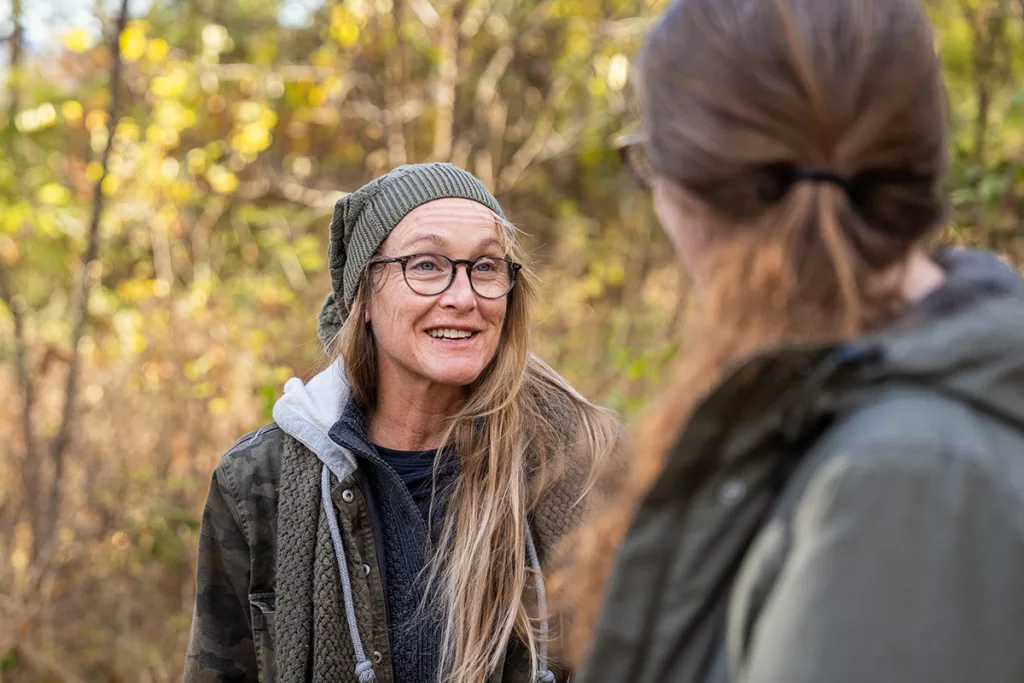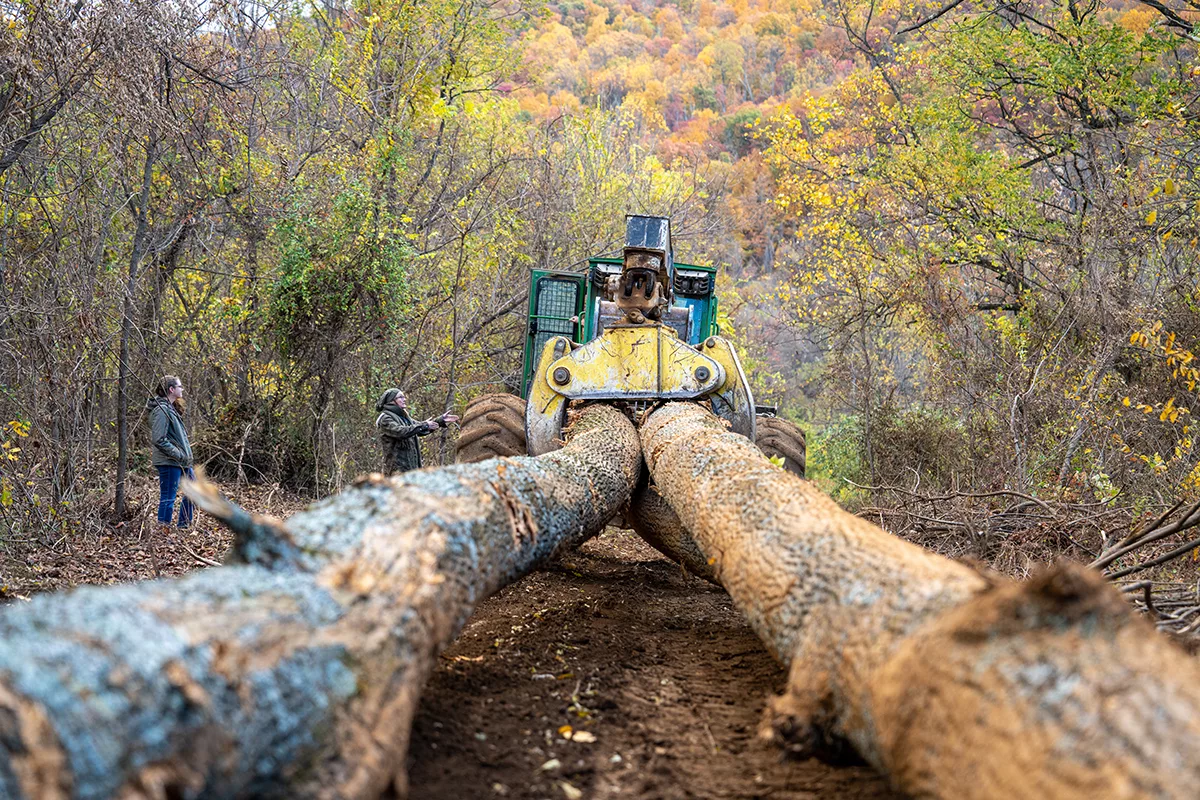Whether your property is large or small, conserved or not, you likely have a desire to keep it healthy and cared for. That inclination is called “stewardship,” and it means to look after the landscape with its ecological, scenic, economic, and cultural dimensions in mind. For Karen Way, at Ovoka Farm in Fauquier County, stewardship has involved actively rehabilitating her property’s resources by removing aggressive invasive species, excluding livestock from creeks and streams, and, most recently, completing a timber harvest on the forested area of the property.
Nestled in the foothills of the Blue Ridge Mountains at the western edge of the Virginia Piedmont, Ovoka Farm holds a combination of fertile Piedmont lands, water resources, hardwood forest, and historic significance as a strategic location for both armies during the Civil War. The Piedmont Environmental Council once owned the property and permanently protected it from development with a conservation easement. Way, who maintains a sizable herd of full-blood and F1 Wagyu beef cattle, bought Ovoka from PEC in 2013 and has been diligently stewarding the property ever since.
“My favorite thing about Ovoka will always be the cows, but my favorite non-cow thing is seeing the results of our tireless work to turn Ovoka’s ecosystem into a thriving, healthy, and rejuvenated part of the region. We focused on land, water, and trees … and implemented rotational grazing, protected riparian buffers by installing fencing and revamping our water systems, and have put into practice other best management practices,” she said.
In summer 2022, Way contacted PEC, which holds the conservation easement on her property, about doing a timber harvest. Communicating with the easement holder is an important first step for anyone who owns or manages conserved properties and is considering activities that could affect protected onsite resources. After reviewing the Ovoka Farm easement, PEC confirmed that a timber harvest was allowable with a few requirements.

The foremost of those was a 10-year forest stewardship management plan (FSMP), which sets forth the landowner’s goals for the entire property and builds out a schedule of land management activities needed to reach them. Some landowners work with the Virginia Department of Forestry to develop the FSMP, or, as Way did, with a professionally accredited SAF Certified Forester. An evaluation of Ovoka’s for-est found it to be composed of mixed hardwoods roughly 80-125 years old. Its tree quality varied from poor to good, with poor to moderate growth rate and vigor. Invasive plants scattered throughout the forest included honeysuckle, tree of heaven, oriental bittersweet, barberry, multiflora rose, wineberry and stiltgrass.
In other words, that beautiful mountainside forest visible to all who pass by and through Ashby Gap on Route 15 and into Clarke County on Route 50 was not in tip-top ecological condition. Ultimately, Way’s FSMP recommended a timber harvest to reach her primary goals of improving forest health and wildlife habitat.
Next, the Virginia Department of Forestry created a pre-harvest plan to minimize the impact of logging activities on soil and water quality. This plan identified the location of roads, loading areas, skid trails, streamside buffers, and other sensitive areas on a map for easy viewing and reference. At Ovoka, trees couldn’t be harvested within 100 feet from the streambanks, and temporary crossings had to be constructed to prevent logging equipment from harming the waterways.
Once that was all done, Way’s forester partnered with a timber crew to implement a sustainable harvest, taking into consideration the long-term well-being and regeneration of the forest. In Ovoka’s case, only certain trees were marked for removal, and those left behind exhibited good form, size and genetics. They also varied in age and will contribute to healthy stand regeneration as they grow and act as a shelter for future seedlings and saplings.

The months-long timber harvest at Ovoka Farm closed early this year, and Way looks forward to a healthier and more resilient forest as regrowth begins. But her stewardship doesn’t end there. Her FSMP includes monitoring for insects, disease, and invasive species, and recommends that she replant shortleaf pine, a species endemic to the Piedmont region, in the coming years.
On a farm as large as Ovoka, land stewardship can be costly. Many agencies offer cost-share assistance for landowners, and grants are sometimes available depending on the project. At Ovoka, Way was able to offset her project costs by selling wood from the harvested trees.
Way says “every landowner needs a solid land management plan that, at a minimum, addresses a property’s top three issues,” and encourages them to look to available resources for help. “It is our moral obligation to protect, enhance, and enrich our ecosystem as best as we can, but we don’t have to do it alone. You can call on the right resources to guide you, like those at PEC, which not only is a wealth of knowledge but worked with us and supported our efforts to enhance our lands without eliminating critical grazing areas.”
I invite you to take a moment to think about your own land management goals. What would you like to improve or protect on your property? If you don’t quite know where to start, consider reaching out to your local Soil and Water Conservation District, the Virginia Department of Forestry, the Natural Resources Conservation Service, Virginia Cooperative Extension offices, or PEC. These groups are a wealth of knowledge and technical resources and will get you off on the right foot to steward your piece of the Piedmont!
This article appeared in the 2023 fall edition of The Piedmont Environmental Council’s member newsletter, The Piedmont View. If you’d like to become a PEC member or renew your membership, please visit pecva.org/join.
